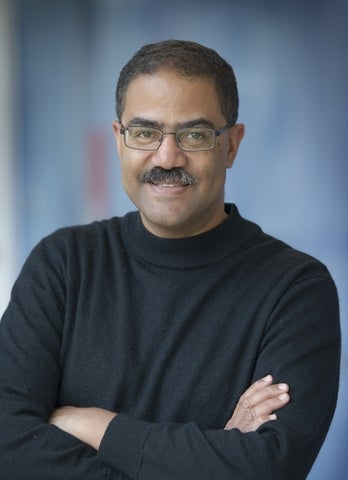
Dr. Trevor Charles
Professor, Department of Biology, Faculty of Science
Professor Trevor Charles is a microbiologist with expertise in bacterial molecular genetics. His research group studies the mechanisms of gene regulatory circuits that control the interactions of Rhizobiales bacteria such as Sinorhizobium meliloti with their eukaryal hosts. The group also develops methods for functional metagenomics using alternate surrogate hosts, and employs these methods to isolate novel genes with interesting functions from microbial community genomic libraries. Current research emphasis is on functional metagenomics, bioplastics and bacterial genome engineering.
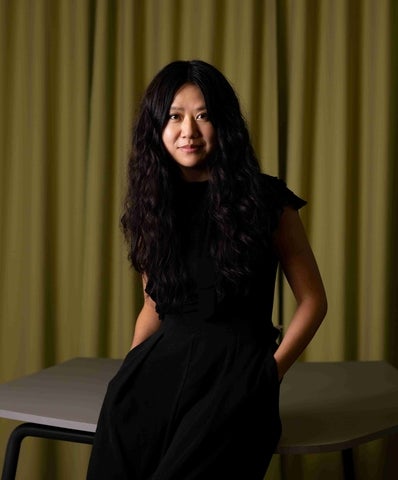
Dr. Lai-Tze Fan
Canada Research Chair in Technology and Social Change, Sociology and Legal Studies, Faculty of Arts
Dr. Lai-Tze Fan seeks to intervene in biased technological design and to heighten technological literacy, with her CRC research focused on artificial intelligence (AI). She is the Director of the U&AI Lab at UW, which uses research-creation methods for enhanced EDI (equity, diversity, inclusion) outcomes in AI design. Fan's research expertise is grounded in Communications, Media Studies, English Literature, Cultural Studies, and Critical Design, as well as Science and Technology studies. She was previously an Assistant Professor at Lingnan University in Hong Kong, a Postdoctoral Fellow at Concordia University in Montréal, and a visiting scholar at the University of Mainz in Germany. She also holds a visiting Associate Professor II position at the University of Bergen, Norway. Fan has collaborated with scholars worldwide, including at MIT, Georgia Tech, and UW’s Institute for Quantum Computing; for this last collaboration, she was the PI for a project that uses VR storytelling to communicate quantum mechanics fundamentals and quantum-assisted machine learning.

Dr. Carla Fehr
Associate Professor, Department of Philosophy, Faculty of Arts
Carla Fehr’s research explores the social nature of science and technology. She investigates how a group’s culture—its values, practices, and structures—influences the knowledge it produces. Fehr wants to know how scientific values such as objectivity and creativity, and ethical values such as justice, equity, and respect support and reinforce each other to help people meet a wide range of practical and epistemic goals. Using an intersectional approach to cases ranging from primatology to AI, she explores how structural injustice, exploitation, and objectification harm scientific and technological research. Fehr is also interested in how love can make science better. For fun, she thinks about how the relationships between humans and dogs support excellence in canine cognition research.

Dr. Jonathan Fugelsang
Professor, Department of Psychology, Faculty of Arts
Jonathan Fugelsang’s research spans several topics in psychology, though his primary focus is on higher-level cognition. Recently, Fugelsang’s lab’s research has predominantly focused on the interplay between intuitive and analytic processes supporting complex Reasoning and Decision Making. These decisions may involve analogical, deductive, or probabilistic information. The lab has also extended its lines of inquiry to look at the role of intuitive and analytic processes in real-world domains, such as creativity, moral judgments and one’s susceptibility to misinformation.

Jin Sol Kim
PhD candidate in English with a BA (Honours English Literature and Rhetoric, Minor Speech Communication) and MA (Rhetoric and Communication Design) from the University of Waterloo.
Her research, which examines [digital] photography as a key discursive site for the construction and reconstruction of racial ideologies, is grounded in digital media studies, science and technology studies, and postcolonial/critical race theory. As a Digital Humanities scholar, Jin Sol is deeply invested in the development of ethical tech and design, and is a lead researcher on racial bias in facial recognition systems at the U&AI Lab at UW.
Additionally, she is a part of two Social Work research initiatives: Grief and Grief Supports in Canada, which surveys the current field of grief support models in Canada, and (Re)Marked Tattoos, which examines commemorative Holocaust tattoos as new sites of public Holocaust memory.
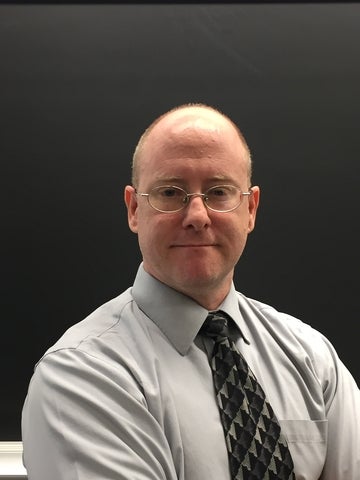
Dr. George Lamont
Continuing Lecturer, Associate Chair, University Communication Requirement Group, Faculty of Arts Teaching Fellow
George Lamont is a continuing lecturer in the Department of English at the University of Waterloo, where George teaches and coordinates Science Communication courses. George’s research focuses on the pedagogy of teaching genre-specific conventions within specific communities involved in science and applied sciences. This includes how to facilitate successful communications within a community but also to non-expert audiences. One aspect of communication of scientific work that fascinates George is the study of how communicators can leverage specific techniques to persuade skeptical audiences to consider previously unexplored problems and support the development of practical solutions.

Kelly McManus
Kelly serves as Associate Vice President, Community Relations & Events. Her portfolio includes leadership of major University events and ceremonies, including convocation, community lectures and signature events such as the Waterloo Innovation Summit. She represents the University on a wide range of community initiatives related to community affairs. Kelly is a PhD Candidate in Recreation & Leisure Studies at the University of Waterloo, where her research focuses on events and community impact. She is a sessional lecturer in the department, and an active volunteer in her community.

Dr. Kate Mercer
Engineering & Research Services Librarian, Adjunct Assistant Professor Systems Design Engineering
Dr. Kate Mercer graduated with a Master of Information from the University of Toronto, and a PhD in Pharmacy from the University of Waterloo, focusing on communicating health information. Kate is the liaison librarian for Systems Design Engineering and Biomedical Engineering at the University of Waterloo where her job includes collaborating with faculty, staff, and students to effectively provide instruction and support and conduct research. At the University of Waterloo, Kate works on strategies related to information and misinformation, understanding the research landscape, and building innovative partnerships that span disciplines.
Kate is passionate about understanding how health information and technology interact, how people are accessing, understanding, and disseminating information, and how to better support students through their undergraduate degrees and beyond. Kate also researches in how engineering and science students navigate information seeking, and how to understand how framing critical appraisal can facilitate both learning and professional practice in the real world. Kate publishes on a range of topics including information literacy, misinformation, scientific communication, artificial intelligence, and empathy in engineering teaching and learning.

Dr. Samantha Meyer
Associate Professor; Associate Director, Graduate Studies, School of Public Health Sciences
Dr. Samantha Meyer is an applied social scientist with expertise in social theory and a variety of methodological approaches used to inform research investigating critical and timely public health problems. Meyer’s specific research focus is understanding the complex social and structural factors that shape population health, and the health of vulnerable populations specifically. The concept of trust as it relates to health communication and acceptance of health promotion efforts is central to her work. Theoretically, she has identified and operationalised semantic distinctions between trust and the related concepts of dependence and obligation that are critical for research investigating and measuring trust. Her empirical research demonstrates the role of trust in the acceptance of health promotion efforts (e.g., vaccine uptake). She completed her graduate and early career research in Australia before returning to Canada as an Associate Professor in the School of Public Health Sciences, University of Waterloo.

Dr. Plinio Morita
Associate Professor, School of Public Health Sciences, Faculty of Health
As the Director of the Ubiquitous Health Technology Lab (UbiLab), Plinio Morita has focused his research on population level surveillance, remote patient monitoring (RPM), and personalized medicine technologies to be used to prevent unnecessary visits to hospitals and drive our healthcare system toward community care and telehealth. The current state of the technology limits how clinicians can use data collected from RPM and IoT systems as the quality, frequency, and reliability of the data is normally lower than clinical standards. The UbiLab expands the area of population-level surveillance, remote patient monitoring, and precision medicine by developing algorithms and systems of systems that combine data from mHealth and IoT sensor technology that can satisfy clinical standards while also providing meaningful use for the patient to the ocean of data currently collected by these smart technologies. In a nutshell, Morita’s research interests are in the areas of population-level surveillance using IoT data, mHealth and wearable technology design, ubiquitous sensors for smart homes, usage data and health data analytics, precision medicine, and technology for aging. All technologies that will help us live longer independent lives.

Dr. Jozef Nissimov
Assistant Professor, Department of Biology, Faculty of Science
Nissimov is an environmental microbiologist with expertise in aquatic virus ecology. He is the lead of the Environmental Virology and Ecology Research Group (ENVERG) at UW. His research group studies the biotic and abiotic factors that affect interactions between important algal and cyanobacterial hosts and their viruses, through laboratory experimentation and field studies. This includes characterisation of viral communities in lakes, sequence and functional analysis of viral genomes, and experimental modeling of infection dynamics in the lab. Recently, Nissimov’s group also branched towards applied research, by studying the largely unexplored antiviral potential of cyanobacteria. His group also collaborates with others at UW on the development of novel sequencing approaches and computational tools for studying SARS-CoV-2 and agricultural viruses in wastewater.
Nissimov is passionate about outreach and tackling misinformation. He authored popular science articles in a foreign language (Bulgarian) about his work in the Arctic and Antarctic during his graduate studies in the UK, participated in the development of educational videos to help high school students explore the process of science during his postdoctoral position in the US, co-creating a mobile app trivia game on COVID-19 misinformation during the pandemic, and engages in outreach activities through the annual Kids' Science Open House at UW.

Dr. Sarah Ruffell
Lecturer, Department of Biology, Faculty of Science
Dr. Sarah Ruffell is a Biology Continuing Lecturer at the University of Waterloo. She has a PhD in Biology and a Graduate Certificate in University Teaching. Through her years of teaching, she has taught a number of courses in health science, biotechnology and microbiology, while maintaining her pedagogical research in science communication. On campus, she has an active role promoting and developing accessible materials for the classroom and, more broadly, for the Science faculty. Within her classroom, she takes inspiration from Ms. Frizzle, and engages students in the course through a variety of pedagogical tools. Most recently, she received the Faculty of Science Outstanding Performance Award and the Jack Carlson Department of Biology Teaching Award for her exceptional work. You are welcome to contact her directly (sruffell@uwaterloo.ca) with any questions or interest in future collaboration.

Dr. Anindya Sen
Professor, Department of Economics, Faculty of Arts
Anindya Sen is deeply interested in understanding the effects of government intervention and policy on the efficiency of markets and overall societal welfare. He has attempted to evaluate the effects of market structure and competition on retail prices in the gasoline and electricity markets. Sen has published research has also focused on assessing the empirical impacts of a wide variety of policies, such as stricter impaired driving laws, mandatory seatbelt legislation, cigarette taxes, and the minimum wage. He is currently studying the effects of deregulating retail alcohol and marijuana markets. Sen believes strongly in the necessity of sharing and communicating research findings with policymakers and the public.
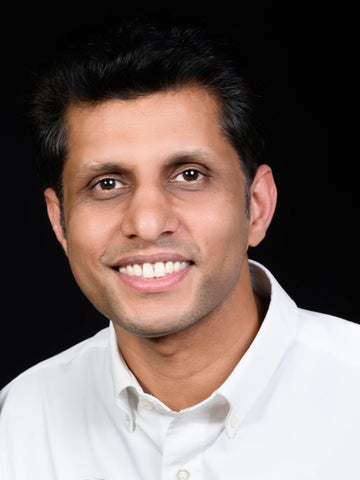
Dr. Makhan Virdi
Lead Research Scientist SSAI and Science Advisor, NASA Atmospheric Science Data Center
Dr. Makhan Virdi, a leading earth scientist, geoinformatics expert, and artificial intelligence (AI) specialist, is passionate about exploring emerging science and technology. His interests extend to the societal perception and implications of these advancements and promoting evidence-based decision-making. He currently holds the position of Science Advisor for the Atmospheric Science Data Center (ASDC) at NASA Langley Research Center, where he provides scientific direction, programmatic support, and facilitates collaboration between NASA's atmospheric science missions, ASDC, and the broader scientific community.
Renowned for his efforts to make earth science data findable, accessible, interoperable, and reusable (FAIR), Dr. Virdi led a team that earned a national award from the US Federal Geographic Data Committee (FGDC). His research interests encompass a broad spectrum of topics, including the application of AI in earth science, land use monitoring, hydrology, climate extremes, agriculture, and atmospheric science.
As a Lead Research Scientist at Science Systems and Applications, Inc. (SSAI), Dr. Virdi leads development of AI-based frameworks for scientific analysis, and capacity building through his mentorship and curriculum development contributions to the Data Science and AI Lab (DSAIL), Software Carpentry, and NASA-Openscapes initiatives.
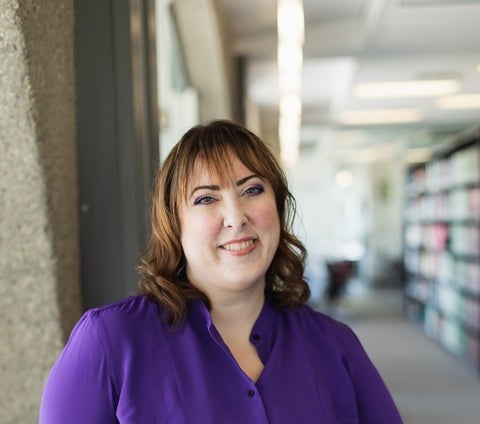
Dr. Kari D. Weaver
Learning, Teaching, and Instructional Design Librarian, Library Office
Dr. Kari D. Weaver (she/her) is an impassioned library educator who believes learning with information is essential to every aspect of our modern world. At the University of Waterloo, this perspective shapes her leadership of information literacy and digital learning in the library. She currently serves as the library representative on her campus New Technologies, Pedagogy, and Academic Integrity Committee where she contributes to policy and pedagogical conversations, decision-making, and professional development programming on generative artificial intelligence in teaching and learning at the University of Waterloo and the Learning Environments Operations (LEO) Committee which provides oversight for the campus LEARN Learning Management System (LMS).
Dr. Weaver’s extensive research background centers on the intersection of human information behavior and pedagogy. She publishes on a wide range of topics including information literacy, academic integrity, misinformation, scientific communication, educational research methods, online learning, and digital accessibility. Professionally, she is the Chair of the ACRL Women and Gender Studies Section (WGSS), an invited member of the American Library Association's prestigious Intellectual Freedom Committee, and a member of the Canadian Association of Professional Academic Librarians’ (CAPAL) Research and Scholarship Committee.